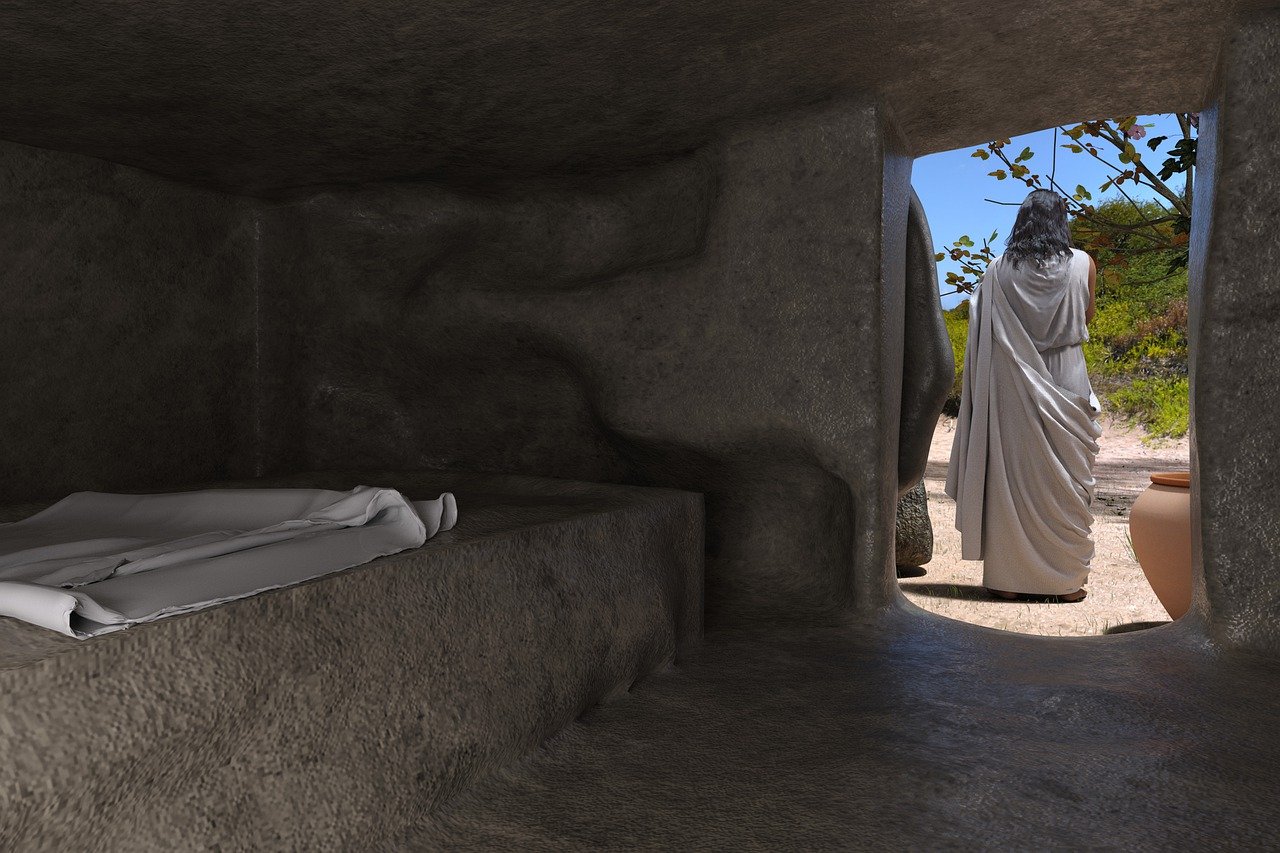
Apr 3, 2021 | NEWS
With the empty tomb of the risen Christ, make yourself aware of it well,
that you have to be a loser to win,
be poor to give something to people,
disappear to last,
be useless to be useful to someone
live in the dark to become light,
die to live,
love and continue suffering.
When it seems like it’s all over, that’s when it all begins.
Fr. John Twardowski

Apr 3, 2021 | NEWS
I would like to invite you to a common spiritual visit to the interior of St. Peter’s Basilica in Rome. Let’s approach the beautiful sculpture of the Pieta by Michael the Archangel. Let us contemplate the mother who holds in her arms the body of her son, tortured, humiliated, covered with spit and traces of the whip strikes. His hands are pierced and his forehead is torn with a crown of thorns. Yet a mother holds her son’s body with great gentleness and infinite delicacy. Her young mother’s face is focused, painful and calm at the same time. Without understanding, she adores the son, so beautiful, though mocked, the son who is her God. Like Mary, let us recognize the face of Christ in the disgraced face of the Church. Neither our sins, nor our betrayals, nor our Luke warmness, nor our infidelities can distort the Church. It remains the exquisite beauty of the saints. He remains young as God’s youth. Let us be able to love the Church and embrace her with the gaze of faith with which Mary embraced the dead Jesus whom she held in her arms. Let us weep for the Church, let us suffer for the Church if we have to, but let us always treat her with that loving and Marian tenderness which Michelangelo’s work so aptly expresses.
Card. Robert Sarah
Excerpt from the book: “The evening is coming and the day is nigh”.

Apr 2, 2021 | NEWS
And he himself, carrying the cross, went out to the place called the Place of the Skull, which in Hebrew is called Golgotha. There they crucified him, and with him two others, one on either side, and Jesus in the middle. Pilate also wrote a title of the guilt and had it put on the cross. And it was written, “Jesus of Nazareth, King of the Jews.” [Jn 19: 17-19]
The death on the cross was one of the most infamous and painful deaths known to antiquity, reserved for the worst members of society and presented as a warning to all. But history is also full of the innocent deaths of those who have fallen victim to violence and the interests of power. Jesus also dies innocent. He tastes the bitter consequences of human sin, but breaks down his power: he responds to hatred with love, to injustice with forgiveness, to insults with prayer. He saves the world with his Cross.
All your life, Lord, was a total gift given always and to everyone,
until you let yourself be picked up on the cross.
In the face of your gift,
I think of my own life that is never fully given
my “yes”, never firm and full.
I find myself weak, selfish and timid.
From your Cross comes a ray of light which tells me about life
that when you died, you gave me the greatest gift.
Fiorenzo Salvi
Giampietro Polini

Apr 1, 2021 | NEWS
And when he had washed their feet, put on his garments and took his place again at the table, he said to them, “Do you understand what I have done to you? You call me “Teacher” and “Lord” and you say it well because I am. So if I, the Lord and Teacher, have washed your feet, you should also wash each other’s feet. For I have given you an example that you should do as I have done for you. ”
In the evening of Holy Thursday we begin the Easter Triduum, remembering the Last Supper of Jesus with the disciples in Jerusalem. He prays with them, breaks the bread and shares the chalice. With these gestures He anticipates the gift of Himself on the cross and illuminates its meaning. He then washes disciples’ feet so that they can understand the new way of life that He is giving them. Every time we take part in the Eucharist, we sit at table with Him, as at the Last Supper.
Lord Jesus,
at your Last Supper you give us the sacrament of your love.
We are called to your table you feed us with your Word,
and the gift of your body and blood.
Stay with us and invite us again to become your witnesses in the world
to wash the feet of the poor, the humble and the needy.
Let us imitate you every day, without sparing ourselves, and only out of love.
Florenzo Salvi
Giampietro Polini

Mar 31, 2021 | NEWS
Then one of the twelve, named Judas Iscariot, went to the chief priests and said, “What are you going to give me, and I will hand him over to you.” And they assigned him thirty pieces of silver. From then on, he looked for an opportunity to hand him over. [Mt 26, 14-16]
What could have prompted Judas to betray the Master and hand him over to his enemies? He was chosen by Jesus himself and called to follow him, he lived with him, he listened to his sermons, he saw miracles … But all this was not enough to convince him. Jesus did not match his expectations and those who were waiting for the Messiah, but certainly not like him! When our expectations are too high or do not match what a person is and can give, then what Judas did to Jesus may happen.
Judas, an insincere and rebellious friend,
also we are!
Forgive us, Lord!
How many times do we not hesitate to betray you and sell you for a few coins.
How many times do we turn our backs on you because we think you have let us down!
How many times do we accuse you of not being and you’re not acting like you should!
You know our fears and uncertainties the bitter taste of our Judas kisses
and after all, you always greet us as friends.
Fiorenzo Salvi
Giampietro Polini

Mar 30, 2021 | NEWS
Simon Peter said to him, “Lord, where are you going?” Jesus replied, “Where I am going, you cannot follow me now, but later you will follow.” Peter said to Him, “Lord, why can’t I follow You now? I will give my life for You. Jesus replied, “Will you lay down your life for me? Truly, truly, I say to you, the cock will not crow until you have denied me three times. [Jn 13: 36-38]
Long-suffering and fragility shine in Peter. He is ready to give his life for Jesus, but also to deny Him in order to save himself. It is a contrast that is also inherent in each of us. We are ready to do what is good and what is right, but we are also blocked by fear of the price to be paid. Only humble awareness of our handicaps helps us not to be surprised by fear in the moment of trial. Peter, only after acknowledging and crying over his denial, will he be ready to give his life for the Master.
How we are like Peter,
Lord Jesus.
We are your fearful students
who don’t know how to stay by your side
at the time of trial.
How easy it is to deny you
how dangerous it is to claim to be a friend!
How easy it is to cheat on you
when something is offered to us
which seems worth more than you.
Don’t leave us in temptation.
Forgive us and trust us again if we’ve done wrong.
Florenzo Salvi
Giampietro Polini






